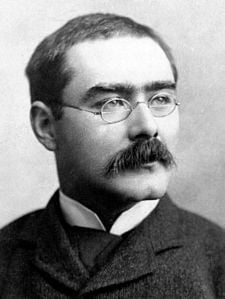
Rudyard Kipling wasn’t perhaps a great poet. Indeed, I believe one sage critic of his poems once said, “Kipling occasionally stumbles upon poetry” or some such witty quip. Kipling was born at the height of the British Empire, and remained an unapologetic imperialist throughout his lifetime. He is vilified even today as a racist, a white supremacist, a war monger, and even a fascist. Kipling’s own words lend credence to these accusations, such as his 1899 poem “The White Man’s Burden,” encouraging the USA during the Spanish American War to follow Britain’s lead in subjugating native peoples worldwide.
TAKE up the White Man’s burden—
Send forth the best ye breed—
Go bind your sons to exile
To serve your captives’ need;
To wait in heavy harness,
On fluttered folk and wild—
Your new-caught, sullen peoples,
Half-devil and half-child.
Kipling was indeed a realist. He recognized the differences among the races. He acknowledged that throughout history, various people groups have subjugated other people groups around the world, as they continue to do today. Kipling was perhaps naive in his sincere belief that such subjugation actually benefited the conquered peoples – leastwise in the case of European colonialism – by bringing them what he considered a superior civilization marked by technological progress and constitutional democracy, regardless of whether the subdued people actually wanted these “advances.” Yet I don’t think it could be said that Kipling viewed other races as inherently inferior in the eyes of God, The closing words of “Gunga Din” testify to this.
Though I’ve belted you and flayed you,By the livin’ Gawd that made you,You’re a better man than I am, Gunga Din!
But the point of this BriRant isn’t to support or condemn Kipling’s political and sociological leanings. Kipling is worth reading because his poems are often tender and profound, like his famous “If—.” Some of them are also truly prophetic. My favorite of his poems by far – “The City of Brass” – was published in 1909 as the twilight loomed on his beloved British Empire upon which it had been said the sun never set. Over a century later, how ominous these words sound for the American Empire, which was in its infancy when the poem was first published. All empires crumble and collapse, usually through corruption from within. Kipling the realist understood that as well.
I am sharing the full text of the poem here rather than just a link, because all of the online resources I have found contain a number of despicable transcription errors which destroy not only the meter and the rhyme, but the very meaning of the words. How can one forge a sward, pray tell?
The City of Brass – Rudyard Kipling (1909)
“Here was a people whom after their works
thou shalt see wept over for their lost dominion:
and in this palace is the last information
respecting lords collected in the dust.” –The Arabian Nights.
In a land that the sand overlays – the ways to her gates are untrod –
A multitude ended their days whose fates were made splendid by God,
Till they grew drunk and were smitten with madness and went to their fall,
And of these is a story written: but Allah Alone knoweth all!When the wine stirred in their heart their bosoms dilated.
They rose to suppose themselves kings over all things created –
To decree a new earth at a birth without labour or sorrow –
To declare: “We prepare it to-day and inherit to-morrow.”
They chose themselves prophets and priests of minute understanding,
Men swift to see done, and outrun, their extremest commanding –
Of the tribe which describe with a jibe the perversions of Justice –
Panders avowed to the crowd whatsoever its lust is.Swiftly these pulled down the walls that their fathers had made them –
The impregnable ramparts of old, they razed and relaid them
As playgrounds of pleasure and leisure, with limitless entries,
And havens of rest for the wastrels where once walked the sentries;
And because there was need of more pay for the shouters and marchers,
They disbanded in face of their foemen their yeomen and archers.
They replied to their well-wishers’ fears – to their enemies’ laughter,
Saying: “Peace! We have fashioned a God Which shall save us hereafter.
We ascribe all dominion to man in his factions conferring,
And have given to numbers the Name of the Wisdom unerring.”They said: “Who has hate in his soul? Who has envied his neighbour?
Let him arise and control both that man and his labour.”
They said: “Who is eaten by sloth? Whose unthrift has destroyed him?
He shall levy a tribute from all because none have employed him.”
They said: “Who hath toiled, who hath striven, and gathered possession?
Let him be spoiled. He hath given full proof of transgression.”
They said: “Who is irked by the Law? Though we may not remove it.
If he lend us his aid in this raid, we will set him above it!
So the robber did judgment again upon such as displeased him,
The slayer, too, boasted his slain, and the judges released him.As for their kinsmen far off, on the skirts of the nation,
They harried all earth to make sure none escaped reprobation.
They awakened unrest for a jest in their newly-won borders,
And jeered at the blood of their brethren betrayed by their orders.
They instructed the ruled to rebel, their rulers to aid them;
And, since such as obeyed them not fell, their Viceroys obeyed them.
When the riotous set them at naught they said: “Praise the upheaval!
For the show and the word and the thought of Dominion is evil!”
They unwound and flung from them with rage, as a rag that defiled them,
The imperial gains of the age which their forefathers piled them.
They ran panting in haste to lay waste and embitter for ever
The wellsprings of Wisdom and Strength which are Faith and Endeavour.
They nosed out and digged up and dragged forth and exposed to derision
All doctrine of purpose and worth and restraint and prevision:And it ceased, and God granted them all things for which they had striven,
And the heart of a beast in the place of a man’s heart was given. . .When they were fullest of wine and most flagrant in error,
Out of the sea rose a sign – out of Heaven a terror.
Then they saw, then they heard, then they knew – for none troubled to hide it,
A host had prepared their destruction, but still they denied it.
They denied what they dared not abide if it came to the trial;
But the Sword that was forged while they lied did not heed their denial.
It drove home, and no time was allowed to the crowd that was driven.
The preposterous-minded were cowed – they thought time would be given.
There was no need of a steed nor a lance to pursue them;
It was decreed their own deed, and not chance, should undo them.
The tares they had laughingly sown were ripe to the reaping.
The trust they had leagued to disown was removed from their keeping.
The eaters of other men’s bread, the exempted from hardship,
The excusers of impotence fled, abdicating their wardship,
For the hate they had taught through the State brought the State no defender,
And it passed from the roll of the Nations in headlong surrender!
Indeed, it seems that most of the members of our society now have “the heart of a beast” in the place of men’s hearts. As a society, we have indeed ascribed “all dominion to man,” and “given to numbers the Name of the Wisdom unerring.” Having turned our backs on God as a society, is it any wonder that God has left us to stew in our own juices? The signs of the coming of the host prepared for our destruction are all around. But perhaps most frightening of all is that most of those who recognize the coming onslaught and imminent collapse of our civilization remain silent, and even complicit in the abandonment of our principles, just as the Viceroys in this poem did, out of fear that by rocking the boat they will lose their own security – not recognizing that it is only an illusion created to lull us into complacency.


I finally found a printed copy of “The City of Brass” in a complete collection of Kipling’s poems I saw in a dear friend’s library. As I read the poem from that book, I immediately noted a typo in my own poor transcription from the defective versions I had previously found online. My friend was kind enough to allow me to borrow his book so that I could correct those typos.